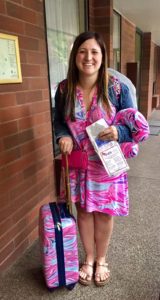Rebekah Funkhouser has plenty to say about UMW. The Washington Guide tells prospective students about scholarships, financial aid … and the time she saw a live camel crossing Ball Circle. But it’s the first thing she shares with the groups that gather for tours across campus that makes her own journey through college so personal.
“I have a cochlear implant,” she says. “If I don’t answer your question, ask me again.”
The device restored the hearing she lost as an infant, but it took years to polish her speech. Now, with an internship at one of the country’s top hearing research centers under her belt and help from UMW’s Office of Disability Resources, she’s found a new voice. And in the career she plans to pursue in audiology, she’ll help others find their voices, too.
“I just want to be an advocate for spoken language,” said Funkhouser, a junior psychology major with a linguistics minor. “I think it’s completely possible for hearing-impaired people to learn how to talk and talk well.”

She was just 9 months old when bacterial meningitis – the country’s second most common cause of auditory loss – took her hearing, forcing her parents to fit her with not one but two hearing aids. When they failed to work, doctors placed a cochlear implant inside her head behind her right ear, to stimulate the auditory nerve. After the hours-long surgery was over, Funkhouser’s battle was just beginning.
For years, she would climb in the car with her mother on Saturdays for the two-hour trek from their home in Mount Jackson, Virginia, to an auditory specialist in Richmond. Little by little, through techniques like imaginary dialogue with dolls and stuffed animals, she perfected her speech.
“My therapists always wanted me to be more and more specific,” said Funkhouser, who owned a town full of conversation-inducing Barbie gear – dream house, hotel, airplane, you name it. “Speech therapy pushed me to become an extreme storyteller.”
From kindergarten through high school, she blossomed in her small tight-knit community, but the cafeteria and other loud places posed problems. Music class was “a nightmare,” she said. Restaurants and concerts – think Justin Bieber, Darius Rucker and Miley Cyrus – take the frustration up one more notch.
So when Funkhouser headed to college, she made it a point to learn what tools each school could offer. Mary Washington – with multiple resources, including the TypeWell system, where professors wear microphones that send lectures to off-site transcribers – rose to the top.
Funkhouser was a sophomore when she landed her first internship, a stint with her childhood auditory therapist, where “it was really cool to be on the other side of things,” she said.
A second internship this past summer – this one at the Oregon Hearing Research Center in Portland – took her over the top. Of the hundreds who applied, only two dozen were chosen by the facility, where many researchers, including Funkhouser’s mentor, Dr. Lina Reiss, have hearing loss themselves.
“It was a really unique experience,” Funkhouser said. “I got to learn alongside someone who’s had the same hardships as me.”
As she conducted her own study, examining the perceptions of people with both cochlear implants and hearing aids, she referred to the notes she’d hauled across the country. Thick with information about data collection, ethics, presentation and more, the lessons she’d learned in UMW Associate Professor of Psychology Hilary Stebbins’ research methods class “came up over and over again.”
“She’s an extraordinarily driven student,” Stebbins said of Funkhouser. “She doesn’t just take every opportunity, she goes out and finds opportunities to do really impressive things.”
Like joining a faculty-led program to Venice and Croatia, traveling to Central America with Students Helping Honduras, joining next semester’s Three-Cities study abroad program in Italy, and prepping for grad school. “Dr. Becky” has a nice ring to it, said Funkhouser, who plans to pursue a degree in speech therapy or audiology. For now, she’s pouring her energy into enjoying her time as an undergrad.
“I love bragging about how awesome Mary Washington is,” she said. “It’s really fun to take people on tours and tell them about the school and all we have to offer.”





I went to school at MWC with an Alice Funkhouser in the ’60’s. Any relation to Rebekah?
Hi Margaret,
This is Rebekah. I am not related to Alice Funkhouser.
I was wondering the same thing! When you have a moment please tell me about a cochlear transplant.
Thank you,
Susan Oertel
I am a Mary Washington Alum (class of ’65) with a severe hearing loss. A hearing specialist I have been going to recently mentioned a cochlear transplant about which I know nothing. Although I will be 73 next month I am very active and am so tired of having to have people repeat themselves. I would love to hear from you.
Hi! I received my cochlear implant at a very young age but I have met adults who got their cochlear implant as adults and enjoyed the quality of sound. There is no age limit on who can receive a cochlear implant. There are a lot of different factors that can impact your decision such as when you lost your hearing, the cause of hearing and residual hearing you have left can all play a role in whether you want to get a cochlear implant. I recommend talking to an audiologist about what would be best for you because it varies person to person.
My email is rfunkhou@mail.umw.edu if you have specific any questions about cochlear implants!
Thanks so much. Susan